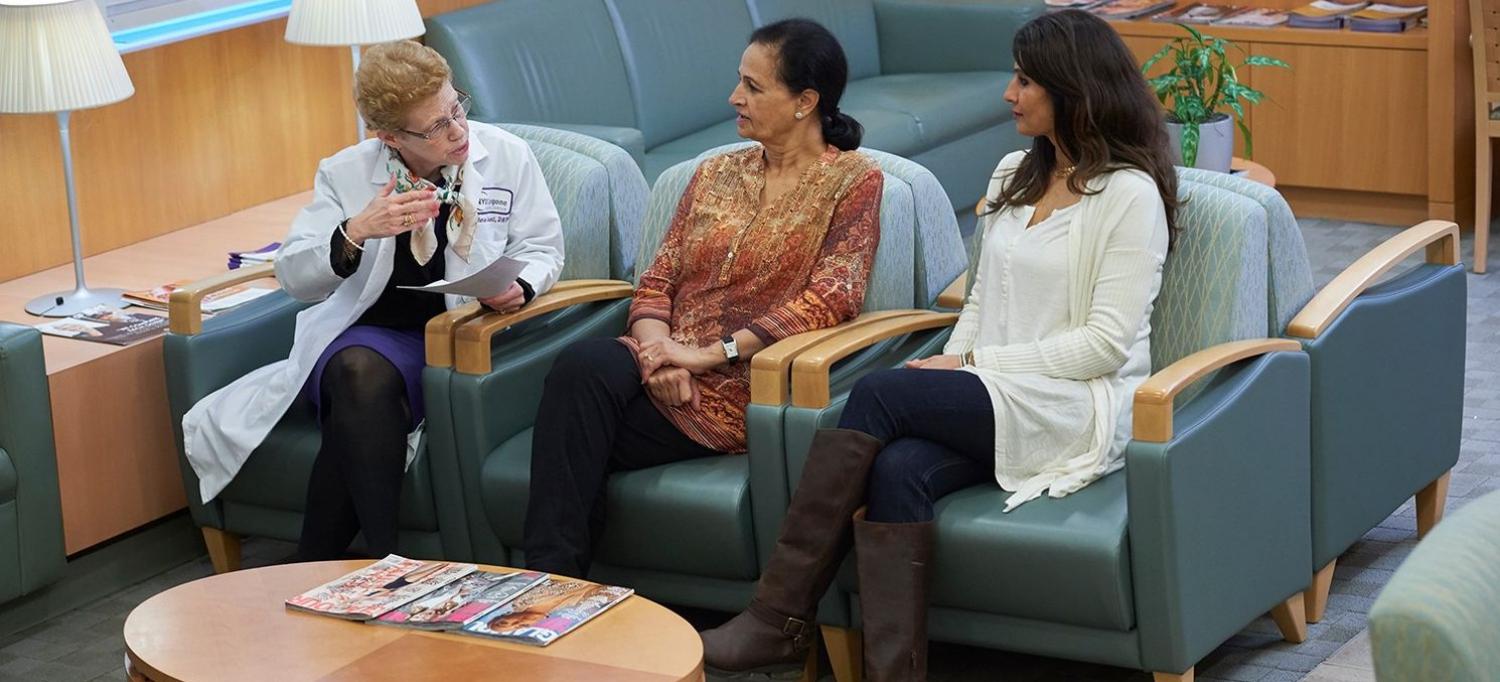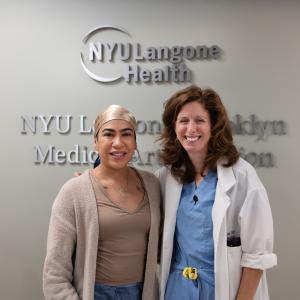
NYU Langone nurses and social workers are increasing the number of patients who have a healthcare agent as part of their advance care plan.
Photo: Juliana Thomas
As a nurse in the oncology–pulmonary–medicine unit at NYU Langone’s Kimmel Pavilion, Taylor Harrington, RN, noticed that many of her patients do not have a designated healthcare agent, also known as a healthcare proxy—someone who can make medical decisions and carry out their wishes when they are unable to do so.
Harrington feels it is important that her patients—many of whom have serious conditions such as heart failure and cancer—have control over their treatment choices.
Having a healthcare proxy is a key part of advance care planning. It gives patients control over who can make medical decisions on their behalf if they become incapacitated, either by illness or injury. Because this can happen at any time, NYU Langone encourages all patients, whether they are admitted to one of our hospitals or receiving care at one of our doctor’s offices, to have healthcare proxies on file. At NYU Langone, nurses are part of this effort, as are social workers and others trained in advance care planning.
“Nurses are required to ask about healthcare proxies when patients come to the floor,” Harrington says. “We noticed that if we made small changes in these conversations with patients, we could increase the number of people who designated an agent.”
This includes encouraging patients to fill out a healthcare proxy form at the time of admission to the hospital, instead of putting it off. In Harrington’s unit, the clinical team also discusses the status of patients’ advance care planning at a daily interdisciplinary huddle. The effort, which started in December 2018, raised the healthcare proxy rates in the unit from 40 percent to 69 percent in less than a year.
In March 2020, Harrington’s unit was transitoned to be the first designated acute care unit for patients who have 2019 coronavirus disease (COVID-19). Having a healthcare proxy is crucial with COVID-19, as the illness can progress quickly and lead to treatments, such as a mechanical ventilation, that impede the ability to communicate.
“Nurses have a critical role to play here because we are the ones who spend the most time with the patients and the ones who get to know them the best,” says Katie Weathers, RN, nurse manager on Taylor’s unit. “And while these can be difficult discussions, we want them to have that say in their care.”
After a patient completes paperwork to designate a healthcare proxy, it is uploaded to the person’s medical chart so that all of their healthcare providers know who the patient wants to make decisions on their behalf. In addition, people can access their healthcare proxy form and other advance care planning documents through their NYU Langone Health MyChart account.
Every person age 18 and older should have one, but ideally two, designated healthcare agents, says Christine M. Wilkins, PhD, LCSW, manager of NYU Langone’s Advance Care Planning Program. The chosen healthcare agents are ideally people who can make difficult decisions in a stressful situation. “It’s not about choosing your closest friend,” Dr. Wilkins says. “It’s about choosing the person you trust will honor your wishes and who can make difficult decisions in a crisis.”
About one in three NYU Langone patients has an advance directive and healthcare proxy, says Dr. Wilkins. For people with serious illness, that number rises to about 70 percent.
“Detailed advance care planning conversations are an essential component of patient-centered care,” says Kevin D. Hauck MD, MPH, who as a physician champion advocates for increasing the number of patients who have an advance care plan. “They help ensure that the care provided to patients aligns with their values, goals, and beliefs.”
Many people fill out their proxy forms with the help of their nurse, social worker, or other care team members. When people need extra help understanding advance care planning and the relevant forms, Dr. Wilkins and the advance care planning team are available to facilitate conversations with patients and their families. “We encourage these conversations to occur early on with their primary care doctors and to be reviewed regularly,” she says.
In these conversations, Dr. Wilkins explores what living well means to the person. They discuss family or friends who were critically ill, and what they learned from that experience. “By having this conversation, we are able to complete a meaningful healthcare proxy form,” she says.
For someone with a serious, chronic, or life-limiting illness, the advance care planning conversation also focuses on the person’s understanding of their medical condition, complications that can arise, and available life-sustaining treatments, such as cardiopulmonary resuscitation (CPR). The electronic New York State medical orders for life-sustaining treatment (MOLST) is completed for people who are ready to make a decision about their end-of-life care. These conversations are held in collaboration with doctors and nurse practitioners.
“So often, sessions I have with patients end with ‘this was amazing, thank you so much, a huge weight is lifted off of my shoulders,’” Dr. Wilkins says. “What each person wants at the end of life matters, and it’s important for us to listen and to have these conversations.”

